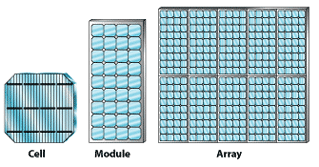Residential Solar Cells &
Panels

Probably the most important part
of a residential solar energy system is the solar panel (sometimes
also referred to as 'module'). These
are comprised of individual solar cells connected together, in a
series, to produce a higher voltage. The solar panels
themselves can also be wired in conjunction with one-another, called
an array, to
produce even more power. In simple terms, a solar cell
captures the suns rays and transfers that electricity to be
immediately used by a device or to be stored in a battery for later
use. The amount of power that a panel can capture varies by
the material they are constructed from and is very dependent on
environmental conditions such as amount of sunlight and position of
panels relative to it. They can be placed in a fixed position
or motorized to track the suns movement. The main types of
residential solar cells (photovoltaic) are...
Crystalline Silicon (c-Si)
Silicon is the most widely used material in the
production of solar cells, accounting for 90% of the worlds
distribution. There are two primary types and are
differentiated mainly by the purity of the silicon and efficiency in
capturing power.
Monocrystalline Silicon Solar Cells (mono-Si)
- These are smaller in size and produce more energy (up to 20%
efficient) than poly. They have longer life spans (around 25)
but cost more.
Polycrystalline Silicon Solar Cells (mc-Si)
- These cost less but efficiency only goes up to around 16%.
They will also require a larger space to produce the same power as
mono.
Thin-Film Solar Cells (TFSC)
This technology involves placement of
photovoltaic material on different substrates. Energy
efficiency typically averages about 9%. This type of solar
cell can be made into flexible sheets and be inexpensive compared to
crystalline variations. They will not last as long and are not
commonly used in home solar electricity applications.
The two factors that people consider most when
buying solar panels are the cost and space required for the energy
that's needed.
Energy Informative has a great section about how to calculate
the total cost of a residential solar energy system setup.
For some additional information
visit the sites below. (you may want to bookmark this website first?
:)
National Renewable Energy Laboratory is a government agency
(DOE) that provides allot of valuable information on solar cells and
related subjects.
Planning a Home Solar Electric System (energy.gov)
|